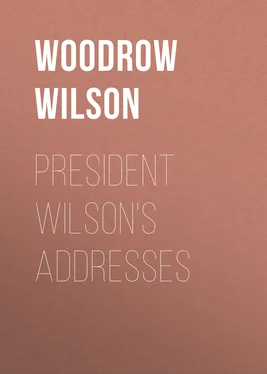Woodrow Wilson - President Wilson's Addresses
Здесь есть возможность читать онлайн «Woodrow Wilson - President Wilson's Addresses» — ознакомительный отрывок электронной книги совершенно бесплатно, а после прочтения отрывка купить полную версию. В некоторых случаях можно слушать аудио, скачать через торрент в формате fb2 и присутствует краткое содержание. Издательство: Иностранный паблик, Жанр: foreign_prose, История, foreign_edu, foreign_antique, на английском языке. Описание произведения, (предисловие) а так же отзывы посетителей доступны на портале библиотеки ЛибКат.
- Название:President Wilson's Addresses
- Автор:
- Издательство:Иностранный паблик
- Жанр:
- Год:неизвестен
- ISBN:нет данных
- Рейтинг книги:5 / 5. Голосов: 1
-
Избранное:Добавить в избранное
- Отзывы:
-
Ваша оценка:
- 100
- 1
- 2
- 3
- 4
- 5
President Wilson's Addresses: краткое содержание, описание и аннотация
Предлагаем к чтению аннотацию, описание, краткое содержание или предисловие (зависит от того, что написал сам автор книги «President Wilson's Addresses»). Если вы не нашли необходимую информацию о книге — напишите в комментариях, мы постараемся отыскать её.
President Wilson's Addresses — читать онлайн ознакомительный отрывок
Ниже представлен текст книги, разбитый по страницам. Система сохранения места последней прочитанной страницы, позволяет с удобством читать онлайн бесплатно книгу «President Wilson's Addresses», без необходимости каждый раз заново искать на чём Вы остановились. Поставьте закладку, и сможете в любой момент перейти на страницу, на которой закончили чтение.
Интервал:
Закладка:
It is plain what those principles must be. We must abolish everything that bears even the semblance of privilege or of any kind of artificial advantage, and put our business men and producers under the stimulation of a constant necessity to be efficient, economical, and enterprising, masters of competitive supremacy, better workers and merchants than any in the world. Aside from the duties laid upon articles which we do not, and probably cannot, produce, therefore, and the duties laid upon luxuries and merely for the sake of the revenues they yield, the object of the tariff duties henceforth laid must be effective competition, the whetting of American wits by contest with the wits of the rest of the world.
It would be unwise to move toward this end headlong, with reckless haste, or with strokes that cut at the very roots of what has grown up amongst us by long process and at our own invitation. It does not alter a thing to upset it and break it and deprive it of a chance to change. It destroys it. We must make changes in our fiscal laws, in our fiscal system, whose object is development, a more free and wholesome development, not revolution or upset or confusion. We must build up trade, especially foreign trade. We need the outlet and the enlarged field of energy more than we ever did before. We must build up industry as well, and must adopt freedom in the place of artificial stimulation only so far as it will build, not pull down. In dealing with the tariff the method by which this may be done will be a matter of judgment, exercised item by item. To some not accustomed to the excitements and responsibilities of greater freedom our methods may in some respects and at some points seem heroic, but remedies may be heroic and yet be remedies. It is our business to make sure that they are genuine remedies. Our object is clear. If our motive is above just challenge and only an occasional error of judgment is chargeable against us, we shall be fortunate.
We are called upon to render the country a great service in more matters than one. Our responsibility should be met and our methods should be thorough, as thorough as moderate and well considered, based upon the facts as they are, and not worked out as if we were beginners. We are to deal with the facts of our own day, with the facts of no other, and to make laws which square with those facts. It is best, indeed it is necessary, to begin with the tariff. I will urge nothing upon you now at the opening of your session which can obscure that first object or divert our energies from that clearly defined duty. At a later time I may take the liberty of calling your attention to reforms which should press close upon the heels of the tariff changes, if not accompany them, of which the chief is the reform of our banking and currency laws; but just now I refrain. For the present, I put these matters on one side and think only of this one thing—of the changes in our fiscal system which may best serve to open once more the free channels of prosperity to a great people whom we would serve to the utmost and throughout both rank and file.
I thank you for your courtesy.
ADDRESS ON THE BANKING SYSTEM
[Delivered at a joint session of the two Houses of Congress, June 23, 1913.]
Mr. Speaker, Mr. President, Gentlemen of the Congress:
It is under the compulsion of what seems to me a clear and imperative duty that I have a second time this session sought the privilege of addressing you in person. I know, of course, that the heated season of the year is upon us, that work in these chambers and in the committee rooms is likely to become a burden as the season lengthens, and that every consideration of personal convenience and personal comfort, perhaps, in the cases of some of us, considerations of personal health even, dictate an early conclusion of the deliberations of the session; but there are occasions of public duty when these things which touch us privately seem very small, when the work to be done is so pressing and so fraught with big consequence that we know that we are not at liberty to weigh against it any point of personal sacrifice. We are now in the presence of such an occasion. It is absolutely imperative that we should give the business men of this country a banking and currency system by means of which they can make use of the freedom of enterprise and of individual initiative which we are about to bestow upon them.
We are about to set them free; we must not leave them without the tools of action when they are free. We are about to set them free by removing the trammels of the protective tariff. Ever since the Civil War they have waited for this emancipation and for the free opportunities it will bring with it. It has been reserved for us to give it to them. Some fell in love, indeed, with the slothful security of their dependence upon the Government; some took advantage of the shelter of the nursery to set up a mimic mastery of their own within its walls. Now both the tonic and the discipline of liberty and maturity are to ensue. There will be some readjustments of purpose and point of view. There will follow a period of expansion and new enterprise, freshly conceived. It is for us to determine now whether it shall be rapid and facile and of easy accomplishment. This it cannot be unless the resourceful business men who are to deal with the new circumstances are to have at hand and ready for use the instrumentalities and conveniences of free enterprise which independent men need when acting on their own initiative.
It is not enough to strike the shackles from business. The duty of statesmanship is not negative merely. It is constructive also. We must show that we understand what business needs and that we know how to supply it. No man, however casual and superficial his observation of the conditions now prevailing in the country, can fail to see that one of the chief things business needs now, and will need increasingly as it gains in scope and vigor in the years immediately ahead of us, is the proper means by which readily to vitalize its credit, corporate and individual, and its originative brains. What will it profit us to be free if we are not to have the best and most accessible instrumentalities of commerce and enterprise? What will it profit us to be quit of one kind of monopoly if we are to remain in the grip of another and more effective kind? How are we to gain and keep the confidence of the business community unless we show that we know how both to aid and to protect it? What shall we say if we make fresh enterprise necessary and also make it very difficult by leaving all else except the tariff just as we found it? The tyrannies of business, big and little, lie within the field of credit. We know that. Shall we not act upon the knowledge? Do we not know how to act upon it? If a man cannot make his assets available at pleasure, his assets of capacity and character and resource, what satisfaction is it to him to see opportunity beckoning to him on every hand, when others have the keys of credit in their pockets and treat them as all but their own private possession? It is perfectly clear that it is our duty to supply the new banking and currency system the country needs, and it will need it immediately more than it has ever needed it before.
The only question is, When shall we supply it—now, or later, after the demands shall have become reproaches that we were so dull and so slow? Shall we hasten to change the tariff laws and then be laggards about making it possible and easy for the country to take advantage of the change? There can be only one answer to that question. We must act now, at whatever sacrifice to ourselves. It is a duty which the circumstances forbid us to postpone. I should be recreant to my deepest convictions of public obligation did I not press it upon you with solemn and urgent insistence.
The principles upon which we should act are also clear. The country has sought and seen its path in this matter within the last few years—sees it more clearly now than it ever saw it before—much more clearly than when the last legislative proposals on the subject were made. We must have a currency, not rigid as now, but readily, elastically responsive to sound credit, the expanding and contracting credits of everyday transactions, the normal ebb and flow of personal and corporate dealings. Our banking laws must mobilize reserves; must not permit the concentration anywhere in a few hands of the monetary resources of the country or their use for speculative purposes in such volume as to hinder or impede or stand in the way of other more legitimate, more fruitful uses. And the control of the system of banking and of issue which our new laws are to set up must be public, not private, must be vested in the Government itself, so that the banks may be the instruments, not the masters, of business and of individual enterprise and initiative.
Читать дальшеИнтервал:
Закладка:
Похожие книги на «President Wilson's Addresses»
Представляем Вашему вниманию похожие книги на «President Wilson's Addresses» списком для выбора. Мы отобрали схожую по названию и смыслу литературу в надежде предоставить читателям больше вариантов отыскать новые, интересные, ещё непрочитанные произведения.
Обсуждение, отзывы о книге «President Wilson's Addresses» и просто собственные мнения читателей. Оставьте ваши комментарии, напишите, что Вы думаете о произведении, его смысле или главных героях. Укажите что конкретно понравилось, а что нет, и почему Вы так считаете.












